One of MAHS’s most elite yet dedicated organizations, the high school Mock Trial team, has been consistently ranked among the top in the state. From winning and placing highly at college invitationals to district playoffs, our mock trial team is very talented.
Mock Trial is just what it sounds like: a mock—or fake—legal trial in which club members must compile and present a fake yet effective display based on evidence and convincing acting. In the commonwealth, the Bar Association fabricates a legal scenario or “case packet” detailing either a crime or lawsuit, including witness affidavits, exhibits, and a summary of the case. Case packets typically include the same basic materials necessary for creating an argument.
Furthermore, in each case packet, there are two sides: the prosecution, and the defense. Their arguments depend on which side the participating students are assigned. Montoursville has enough students to create two teams, a prosecution and a defense. Both teams have six members – three witnesses and three lawyers, whose job is to act out the legal trial portrayed in the case packet. What is difficult is that the students must create all argumentation, storyline, and thematic elements from scratch; this has proven to be a long grueling process for some students.
“…it’s a lot to handle and sometimes a little overwhelming, but the coaches and other members are always there to help,” freshman lawyer Christian Berwanger said.
Significantly, Christian – and sophomore witness Amelia Twigg, are the only first-year team members to be competing at the varsity level.
The other students on varsity include sophomore Rowan Fortin, Junior Lea Bieshline, and freshman Christian Berwanger as prosecution lawyers; sophomore Amelia Twigg, senior Andrew Ware, and senior Sean Frey as prosecution witnesses. The Defense has senior Karleigh Mckenna, senior Sean Rehn, and sophomore Becca Teffeteller as lawyers; senior Jack Deitrich, junior Reese Peterson, and senior Brady Cohen as defense witnesses.
A basic mock trial is about two hours long, providing time for opening statements, direct and cross-examinations of witnesses, and closing arguments. Senior Captain Karleigh Mckenna is the team’s most experienced “Opener,” as she delivers the defense opening statement in this year’s proceedings.
“Delivering an opening statement means you have five minutes to basically tell the jury your side of the story and what they’re gonna be hearing [throughout the following trial],” sad McKenna. “Since it’s an opening statement and not a closing argument, you cannot be argumentative, so you can’t argue anything yet. You’re displaying evidence so the jury knows what to listen for in the case.”
Following opening statements from both sides, the prosecution always goes first, beginning their “case in chief” – essentially the main portion of their argument that allows them to call witnesses in support of their case.
If a witness is called to the stand by the prosecution or defense, then that side is allowed to engage in a “direct examination” of the witness in front of the jury. On direct, the lawyer will ask their corresponding witness open-ended questions that will help further that side’s, legal argument. This is where the witness shines in a trial.
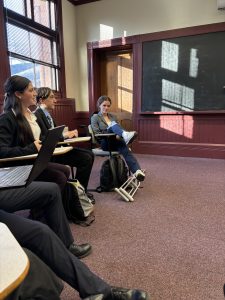
A key element of Mock Trial, for both witnesses and lawyers, is acting. Earlier in the year, the team participated in the Harvard Mock Trial Invitational, in which the Harvard Mock Trial team held seminars detailing crucial pillars for an effective trial. Of which, acting was a main discussion. According to Harvard, the trial is 20 percent legal evidence and 80 percent acting. When it comes to the team’s witnesses, that 80 percent shine through.
The role of a witness is exclusively utilized in direct and cross-examinations, in which lawyers from both sides pick apart the witness’s story of events for a jury. To become familiar with a witness’s story, the actors are provided with affidavits in the case packet. This establishes the extent of knowledge a witness knows about the overall trial. If it’s not in their affidavit, they can’t testify to it.
The concept of witness knowledge of events in relation to their affidavit was actually recently disputed in the team’s most recent trial. According to McKenna, she was remarkably granted “the only sustained objection in [the] trial…” after the prosecution attempted to question her witness on evidence not in their affidavit.
On direct examination, most questions are scripted, since it’s between a witness and a lawyer on the same team. On the cross-examination, the witness is left only with their knowledge of their affidavit, while opposing counsel – the other team – asks leading (yes or no) questions attempting to discredit the witness or flip their argument against them.
Since the witness only has an affidavit to base their character, most of the time they have a lot of freedom to take creative liberties while acting. This is especially enhanced by the type of witness being presented. Typically there are three types: the eye-witness who has personal knowledge of the alleged crime, the character witness who’s kind of a wild card on the stand, and the expert witness. Experts are typically police or forensic officials, so it’s harder to get away with certain character choices since the stereotypical official is stoic in nature.
Finally, once both the prosecution and defense rest their case-in-chief it’s time for closing arguments.
Sophomores Rowan Fortin and Becca Tefetteller perform the closing arguments in this year’s case.
“On a team, one lawyer performs a closing argument, and this is my second year doing this. I have to write an argumentative speech that’s around five minutes long to perform to the jury,” said Fortin, the prosecutor “closer.” “The goal is to sum up all of the evidence and connect unclear points to get the jury to find the verdict I [the prosecution] want them to.”
Fortin then discussed the importance of this speech as, “it is one of the last things the jury hears before deciding their verdict, guilty or not guilty.”
The first weekend in January– before the student body returned from Christmas break– the team proved their dedication.
They attended the University of Pittsburgh’s 2025 Cathedral Classic High School Mock Trial tournament. This is a rigorous competition. According to Mckenna, 52 teams attended the competition this year. Students stay overnight for about three nights, staying up until early in the morning perfecting their case, and by 8 in the morning, they’re at the competition. This invitational is used as a practice event for the following district, regional, and state cases.
“It’s not as competitive as the actual mock trial season, but it’s definitely still a competitive event,” said McKenna.
Both teams, compete twice – one per day. And by the end of the weekend, the administrators of the competition give out special awards to the top performers of the weekend. To qualify for an award, competitors must earn a certain amount of “ranks.” At the end of each trial, the judge or jury – at Pitt they are the same person – provides a ranking list of all the witnesses and lawyers who participated in that trial. THose competing get rankings from scoring well and getting ranked first second or third best witness or lawyer. But in simplified terms, the qualifications for winning an award is to score as the top-ranked witness in both trials you competed in.
This paid off for Senior Captain Karleigh McKenna as she was the only team member to score well enough in both of her trials to gain an overall award by the end of the weekend. She was one of many to win the “Best Overall Lawyer award” with 20 collective rankings – the maximum she could receive. Depending on how good the competition is per year, the administrators at Pitt will change the qualifications for an overall award. To win best lawyer, only students who received 20 ranks, could win. For best witness, they opened it up to 19-20 ranks since the competition was greater.
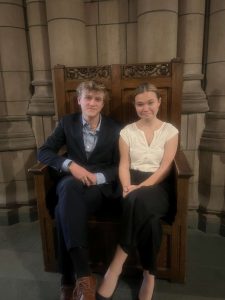
The team did have students who ranked well but didn’t qualify for an overall award. In the first prosecution trial, Seniors Sean Frey and Andrew Ware were ranked second and third for best witness in that given trial. For attorneys, Rowan Fortin scored third and Junior Captain Lea Beishline scored fourth. Then in the prosecution’s second trial, Andrew Ware was ranked first and Sean Frey was ranked second best witness. Lea Beishline ranked first, Christian Berwanger ranked third, and Rowan Fortin ranked fourth as lawyers.
For the Defense’s first trial, Senior Captain Brady Cohen was ranked second, senior Jack Deitrich scored third, and junior Reese Peterson scored fourth as witnesses. On the other hand, Karleigh Mckenna was ranked first, sophomore Rebecca Tefeteller was ranked second, and senior Sean Rehn was ranked third for attorneys. Then in the defense’s second trial, Jack Deitrich placed third, and Brady Cohen placed fourth as witnesses; Karleigh Mckenna placed first again, Sean Rehn placed second, and Rebecca Teffeteller placed third
Aside from individual placements, the team as a whole was ranked out of the 52 teams participating. Last year the team built a reputation for itself, coming in first place and winning the overall competition. This year, with a much bigger pool of students and teams, the team placed tenth. Due to the team’s prior win, they were immediately placed against the top teams in the competition. This is still an incredible achievement and they should be very proud.
This weekend wasn’t all work and stress though; multiple team members expressed that their favorite memories from their total experience in Mock Trial have happened at Pitt’s annual competition.
“…taking the elevator to the top of the Pitt Cathedral and walking around every floor,” with friends between trials was a highlight for Fortin.
Berwanger commented that the trip to Pittsburgh as a whole was his favorite memory, “Not only did I get to see such a beautiful city, I also got to spend it with a lot of nice people.”
After using the Pitt weekend as a trial run for their case, the team got back to work. Specifically, the prosecution as they were scheduled to compete first on the district level. Their trial was initially scheduled for January 16 – about two weeks after their trial run – however they had to push it back to the 17th due to scheduling conflicts.
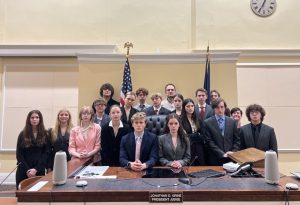
The first district-level trial was Montoursville High School Prosecution versus Punxsatawny High School Defense. Montoursville beat Punxsutawney by a wide margin of 66 points. At district competitions, the teams are allowed to name who they think the best witnesses and attorneys are. Punxsutawney named senior Andrew Ware as Best Witness for his portrayal of the character “Robin Locksley,” and sophomore Rowan Fortin as Best Attorney for her presentation of a Direct and Cross-Examination and the Closing Argument.
This victory allowed Montoursville to move on to its second district competition. The team prepared viciously for this trial as they have a history with their opponent: State College High School. During last year’s district competition Montoursville beat State College by four points; allowing them to move on to Regions. This made State College the number two team in the area, but don’t let that fool you, they are Montoursville’s biggest competition.
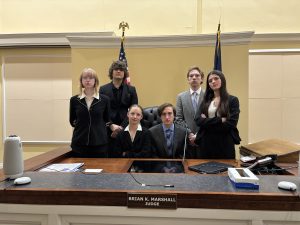
After a heated trial between State College Prosecution and Montoursville Defense on January 27th– ten days after the Prosecution’s first win, the teams named their choices of Best witness and lawyer. Seniors Brady Cohen won best witness for his portrayal of the character “Ali Gerevich,” and Karleigh Mckenna won best attorney for her presentation of the Opening Statement, and a Direct and Cross Examination
Then the teams went home anticipating the release of their scores and the final verdict the next morning. But that didn’t happen.
There were a myriad of discrepancies regarding scoring and timing that took place leading to an unruly final verdict. McKenna contextualizes these mistakes by saying, “…[Firstly] our team scored more points, so the scores were 386 and 389. We had three more points.” Then she elaborated that, “There was an issue because there were three jurors and two of the jurors had ranked State College as winning over us.” So despite winning score-wise, two of the jurors overrode the scores and voted for State college.
Despite such an abrupt ending to the season, the students learned and experienced so much. They deserve recognition and are proud to represent Montoursville in such a rewarding endeavor.
Featured photo (at top): The Montoursville Area High School Mock Trial team briefly poses for the photo during the University of Pittsburgh’s 2025 Cathedral Classic High School Mock Trial tournament. The team didn’t rank overall, but individual members did.

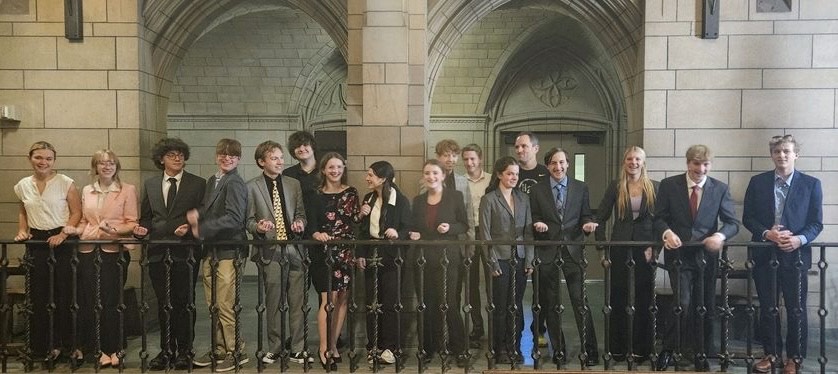

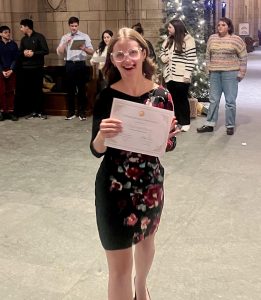

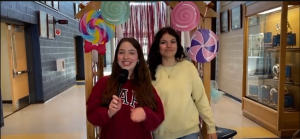
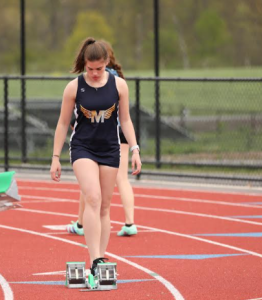
Socials